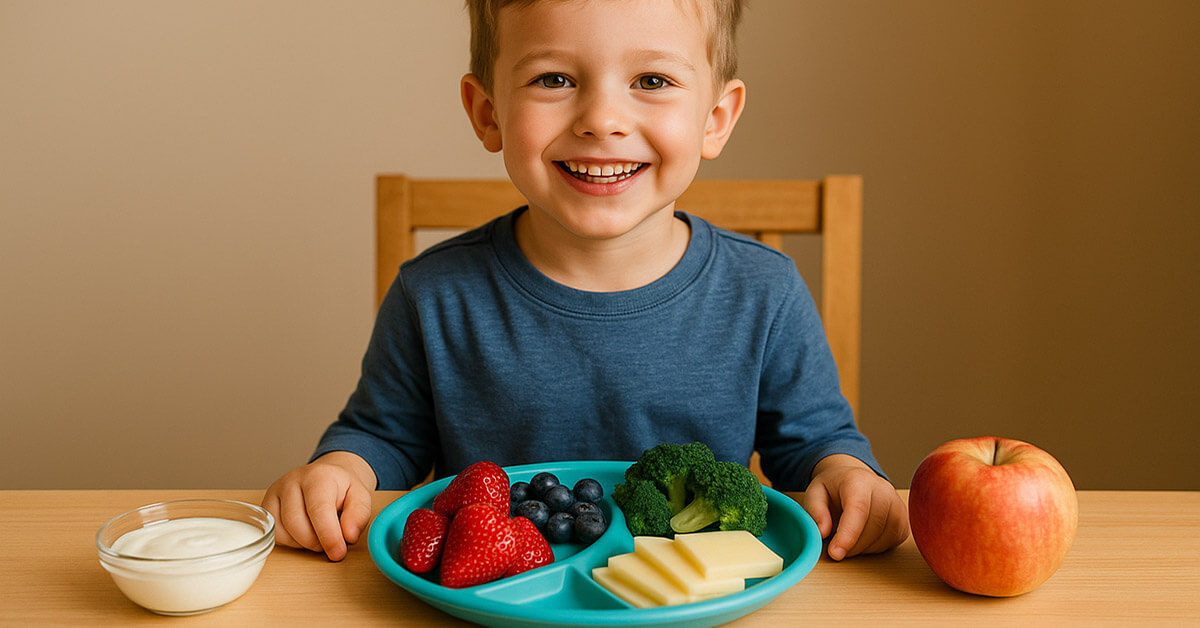
How to Naturally Support Your Child’s Immunity Every Day

Back to school often means back to runny noses and coughs. It is normal for kids to pick up more germs at school or daycare, their immune systems are still learning.
The good news, simple daily habits and a few well-chosen foods and supplements can help support your child’s natural defenses without going overboard.
Why Kids Catch More Colds
Children meet lots of new microbes in group settings, and their immune systems are still building memory. Not enough sleep, a rushed breakfast, and stress around new routines can also make them more vulnerable.
Your goal is not to create a germ-free bubble, it is to give their bodies what they need to bounce back quickly.
Everyday Habits That Build Strong Immunity
1. Solid sleep routines
Most school-age kids need 9 to 12 hours of sleep. During sleep the body releases proteins called cytokines, simple messengers that help the immune system respond to infections. Set a regular bedtime, dim devices after dinner, and use a calm wind-down routine.
2. Outdoor play and daily movement
Moderate activity supports circulation, which helps immune cells move where they are needed. Aim for at least 60 minutes of play, bike rides, or sports most days. Fresh air and daylight also support better sleep at night.
3. Hand hygiene that kids actually follow
Keep it simple, soap and water for 20 seconds before meals and after the bathroom. Pack a small sanitizer for the bus, and teach them to avoid rubbing eyes and nose.
Supplements That May Help Kids’ Immune Health
Supplements are helpers, not magic shields. Use child-specific products, follow labels, and check with your pediatrician if your child has a condition or takes medication.
Fish oil and omega-3s
Omega-3 fats, especially EPA and DHA, help balance inflammation, simple words, they support a calmer, more coordinated immune response. They also support brain and eye development. Choose a kids’ liquid or chewable that lists EPA and DHA amounts, keep in the fridge to preserve freshness.
- Food first: serve salmon, sardines, trout once or twice a week.
- Supplement tip: many families use 250 to 500 mg combined EPA plus DHA daily for school-age kids, always follow your pediatrician’s advice.
Vitamin D
Vitamin D helps immune cells turn on at the right time. Sunlight makes vitamin D in the skin, but many kids run low in winter or if they spend most time indoors. Your pediatrician can guide testing and dosing.
- Food first: fatty fish, fortified dairy, eggs.
- Supplement tip: common children’s doses range from 400 to 1,000 IU daily depending on age, diet, and baseline levels, follow medical guidance.
Probiotics
About 70 percent of the immune system sits around the gut, the microbiome is the community of friendly bacteria that live there. Probiotics are specific strains of these friendly bugs that can support a balanced immune response and regular digestion.
- Food first: yogurt with live cultures, kefir, certain cheeses, fermented veggies like sauerkraut or kimchi in tiny kid-friendly amounts.
- Supplement tip: look for kid formulas with clearly labeled strains and a daily CFU count, start low and observe tolerance.
Immune-Friendly Foods Kids Will Actually Eat
Colorful fruit and veg, especially vitamin C sources
Citrus, kiwi, strawberries, bell peppers, and broccoli provide vitamin C, a simple antioxidant that helps protect cells while the immune system works. Add sliced peppers to lunch boxes, blend berries into yogurt, roast broccoli with olive oil and a pinch of salt.
Cheese and yogurt for protein and live cultures
Plain yogurt topped with fruit, or a small piece of cheese with whole-grain crackers, gives protein for steady energy. Yogurt with live cultures also feeds the gut microbiome. Choose unsweetened options and sweeten at home with fruit or a drizzle of honey for kids over one year.
Eggs, beans, and lean proteins
Immune cells are made from protein. Eggs at breakfast, hummus with veggie sticks, or chicken in a wrap help kids meet their needs without much fuss.
Whole grains and healthy fats
Oats, brown rice, and whole-grain bread provide fiber that feeds good gut bacteria. Olive oil, nuts, and seeds add vitamin E and healthy fats that support cell membranes, think of them as protective coats for cells.
Hydration that kids enjoy
Water keeps mucus thin and helps the body flush germs. Offer water first, then milk or fortified plant milks with meals. Keep sugary drinks for rare occasions.
Simple Weekly Planner for Busy Parents
- Breakfast ideas: yogurt parfait with berries, scrambled eggs and toast, oatmeal with banana and unsweetened peanut butter.
- Lunchbox ideas: turkey and cheese roll-ups, whole-grain pasta salad with veggies, hummus with pita and fruit.
- Dinner ideas: salmon with rice and broccoli, taco bowls with beans and avocado, veggie omelet with side salad.
- Snacks: cheddar cubes and apple slices, kefir smoothie, trail mix with nuts and raisins if school policy allows.
When to Call the Doctor
Frequent or severe infections, poor growth, extreme fatigue, or breathing trouble always need medical attention. Ask your pediatrician about vitamin D dosing, fish oil use, and whether a probiotic is appropriate for your child’s age and health.
Frequently Asked Questions
Do kids need immune supplements every day
Not always. Focus on sleep, balanced meals, and activity. Supplements like vitamin D, omega-3s, and probiotics can help in specific seasons or situations. Use child-specific products and follow professional advice.
What probiotic should I choose
Pick a kids’ formula with clearly labeled strains and a daily CFU amount. Start with one product, watch for tummy comfort and regularity, and keep it simple.
Can I boost immunity quickly before school starts
There is no instant switch, but a week of earlier bedtimes, daily outdoor play, water first, and steady meals will already help. Keep going for lasting benefits.
Is honey safe for coughs
Honey can soothe coughs for children over one year. Do not give honey to babies under one year due to the risk of infant botulism.
Should I avoid dairy during a cold
Most children tolerate dairy fine when they are sick. If milk seems to worsen mucus for your child, try yogurt or cheese instead and focus on hydration.
This article was originally published on Stackbb, your trusted source for science-based supplement guides.







